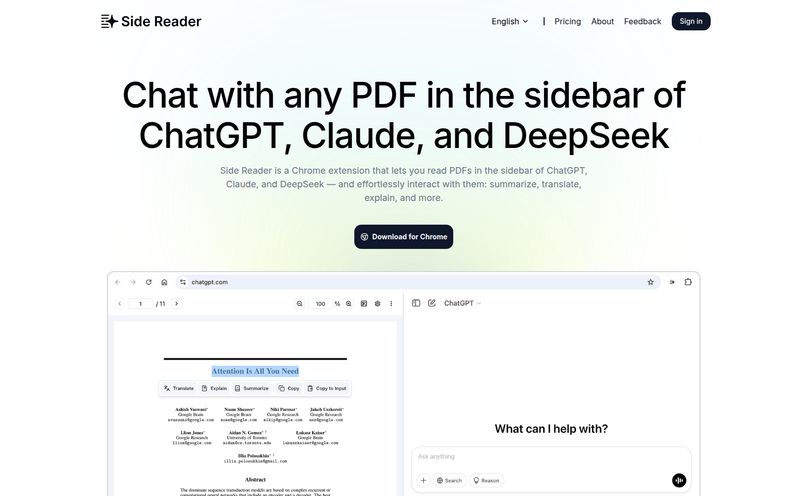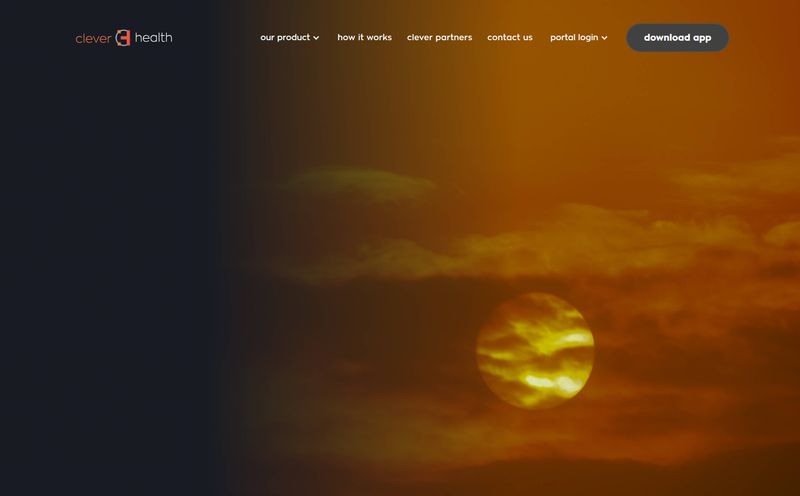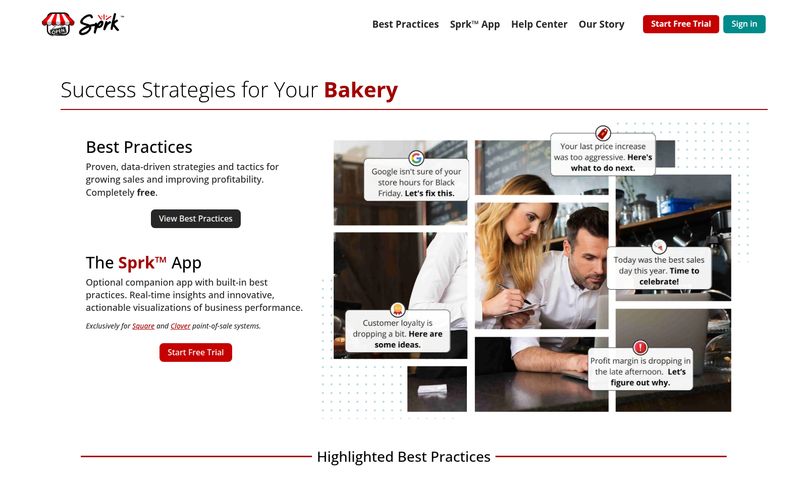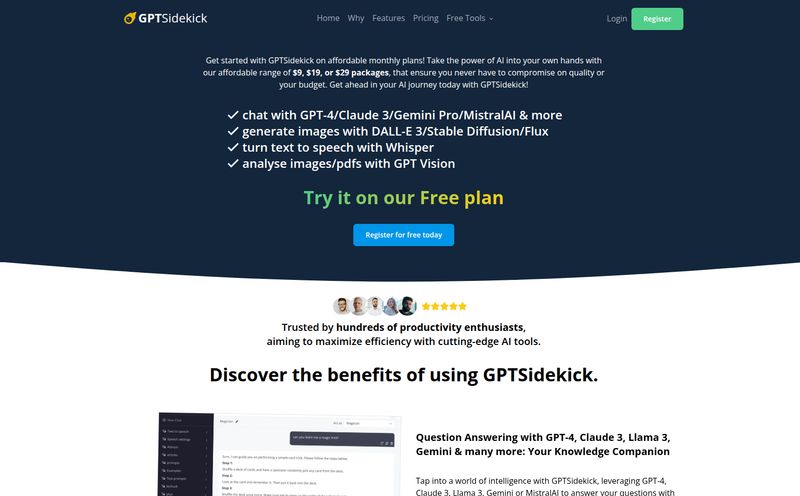You’ve done it. You spat in a tube, mailed it off to a company like 23andMe or AncestryDNA, and waited weeks with a weird mix of excitement and dread. Then, the email arrives. Your results are in! You click the link, and… you’re staring at a wall of data, SNPs, and scientific jargon that might as well be written in Klingon. Sound familiar?
I’ve been there. As someone who lives and breathes data for a living—SEO, traffic, CPC, all that jazz—I thought I'd be prepared. I was wrong. It’s like being handed the source code to yourself, but the documentation is missing. You know there are secrets in there, but how do you get them out? For years, you either had to pay another service a hefty fee or have a friend who’s a geneticist. Until now, maybe.
I recently stumbled upon a new tool called GenoXplorer, and my curiosity was immediately piqued. An AI-powered platform that claims to analyze your genetic report instantly and for free? Skepticism level: high. But hey, my job is to check out new trends and tools, so I jumped in. And I have some thoughts.
So, What is GenoXplorer Anyway?
Think of GenoXplorer as your personal translator for the dense language of genetics. It's a web-based tool that uses artificial intelligence to read your raw genetic report and spit out understandable insights. We’re talking potential health implications, what certain genetic markers might mean, and the science behind it all, explained in plain English.
It’s not trying to replace a genetic counselor (and we’ll talk more on that later). Instead, it’s positioned as a first-pass analysis tool. A way to get your bearings and turn that confusing data dump into a starting point for further research or conversation. And the best part? It’s completely free. No credit card, no sign-up, no nonsense.

Visit GenoXplorer
How Does GenoXplorer Work? The User Experience
This is where I was expecting a catch. A clunky interface, a million pop-ups, something. But honestly, it’s slick. The process is dead simple:
- You go to their website.
- You see a box that says, “Drag and drop your document here.”
- You drag your genetic report file—it supports a bunch of formats like .pdf, .jpg, and even .png files—and drop it in.
And that’s it. Within seconds, the AI does its thing and presents you with an analysis. It’s incredibly fast. The lack of friction is a huge win. In an age where just signing up for a newsletter can feel like a ten-step process, this simplicity is a breath of fresh air.
The Big Question: Is It Really Free?
Yes. One hundred percent. I kept looking for the pricing page or the “upgrade for full results” button, but it doesn't exist. This is a pretty disruptive model in the health tech space, where everything seems to have a subscription attached. The fact that GenoXplorer offers this level of analysis without asking for a dime is its biggest headline feature. Of course, that immediately leads to the next, more important question…
Let's Talk About Data Privacy (This Is Important)
Okay, this is the part where my inner tech-and-privacy nerd gets on a soapbox. If a product is free, YOU are often the product. Our data is the currency of the internet, and genetic data? That’s the gold standard. So, I dug into their privacy policy with a fine-tooth comb.
And here’s the killer feature that made me relax: GenoXplorer explicitly states that your data is not stored.
Let that sink in. You upload your report, the AI analyzes it in that session, and once you close the browser, it's gone. They aren’t building a massive database of user DNA to sell to pharmaceutical companies or insurance providers. For me, this is a non-negotiable, and they nailed it. In a world of data breaches and shady data brokering, this commitment to privacy is, frankly, more valuable than the analysis itself. It shows a fundamental respect for the user that is so often missing.
The Good, The Bad, and The Genomic
No tool is perfect. It’s important to look at this with a balanced view. So lets break it down, conversationally.
What I Liked (The Pros)
First off, the immediacy is amazing. Going from a confusing PDF to an itemized list of insights in less time than it takes to make a coffee is just… cool. The user-friendly drag-and-drop interface means anyone can use it, no tech skills required. And as I’ve already gushed about, the combination of being totally free and privacy-focused is a powerful one-two punch. It democratizes access to personal health information, taking it out of the hands of only those who can afford expensive follow-up services.
A Word of Caution (The Cons)
Now for the reality check. The platform is very clear that the analysis is for informational purposes only. This is not a doctor. This is not a medical diagnosis. The AI is making predictions based on data, and as with any AI, it might not be 100% accurate. You absolutely should not make any health decisions based solely on what GenoXplorer tells you.
Think of it like WebMD. It’s a great place to start, it can point you in the right direction, but you wouldn’t diagnose yourself with a rare disease based on a website. Use it to formulate better questions for your actual doctor or a certified genetic counselor. It’s a tool for curiosity, not for clinical diagnosis. A very important distinction.
Who Is This Tool Really For?
I see a few groups getting a ton of value out of this:
- The Recently Tested: Anyone who just got their 23andMe, AncestryDNA, or other genetic test results and is feeling overwhelmed.
- The Bio-Hacker: People who are actively trying to optimize their health and want every last drop of data to work with.
- The Generally Curious: If you love learning and want to understand yourself better, this is a fun, no-risk way to engage with your personal data.
- Students: Anyone studying genetics or bioinformatics could find this a fascinating practical tool to play with.
It's probably not for someone who has a serious, diagnosed medical condition and is looking for specific guidance. That’s a job for a medical professional, full stop.
My Final Verdict on GenoXplorer
So, is GenoXplorer worth your time? Given that the investment is about 30 seconds and zero dollars, I’d say absolutely. It successfully solves a very common problem: the confusion and inaccessibility of raw genetic data.
It’s a fantastic example of AI being used for good—empowering individuals with knowledge. As long as you walk in with the right expectations and remember that it’s an informational guide, not a medical oracle, it’s an incredible resource. The commitment to user privacy is the cherry on top that makes me comfortable recommending it. It’s a smart, simple, and surprisingly powerful little tool.
Frequently Asked Questions about GenoXplorer
- Is GenoXplorer really free to use?
- Yep. I was skeptical too, but it's 100% free. There are no hidden fees, subscriptions, or premium versions. You just upload your report and get your analysis.
- Is my genetic data safe with GenoXplorer?
- This is one of its strongest points. GenoXplorer states that it does not store your data. The analysis happens in real-time, and your information is gone once you leave the site. This privacy-first approach is a major plus.
- Can GenoXplorer diagnose a medical condition?
- No, absolutely not. The platform makes it very clear that its analysis is for informational and educational purposes only. It is not a substitute for professional medical advice, diagnosis, or treatment. Always consult with a doctor or genetic counselor about any health concerns.
- What file formats can I upload to GenoXplorer?
- It's quite flexible. The platform accepts several common document formats, including .pdf, .jpg, .jpeg, and .png. This should cover the report formats from most major genetic testing companies.
- How accurate is the AI-powered analysis?
- The responses are predictive and based on existing scientific literature and data models. While they can provide fascinating insights, they may not be entirely accurate or definitive. Think of it as a highly educated guess that can guide your own research.
- Do I need a science background to use it?
- Not at all. The whole point of the tool is to take complex scientific data and translate it into easy-to-understand language. It’s designed for the average person, not a genetics expert.
Reference and Sources
- 23andMe - A popular consumer genetic testing service.
- STAT News - Artificial Intelligence - For further reading on the intersection of AI and healthcare.
- Electronic Frontier Foundation (EFF) - Privacy - A great resource for understanding digital privacy issues.



